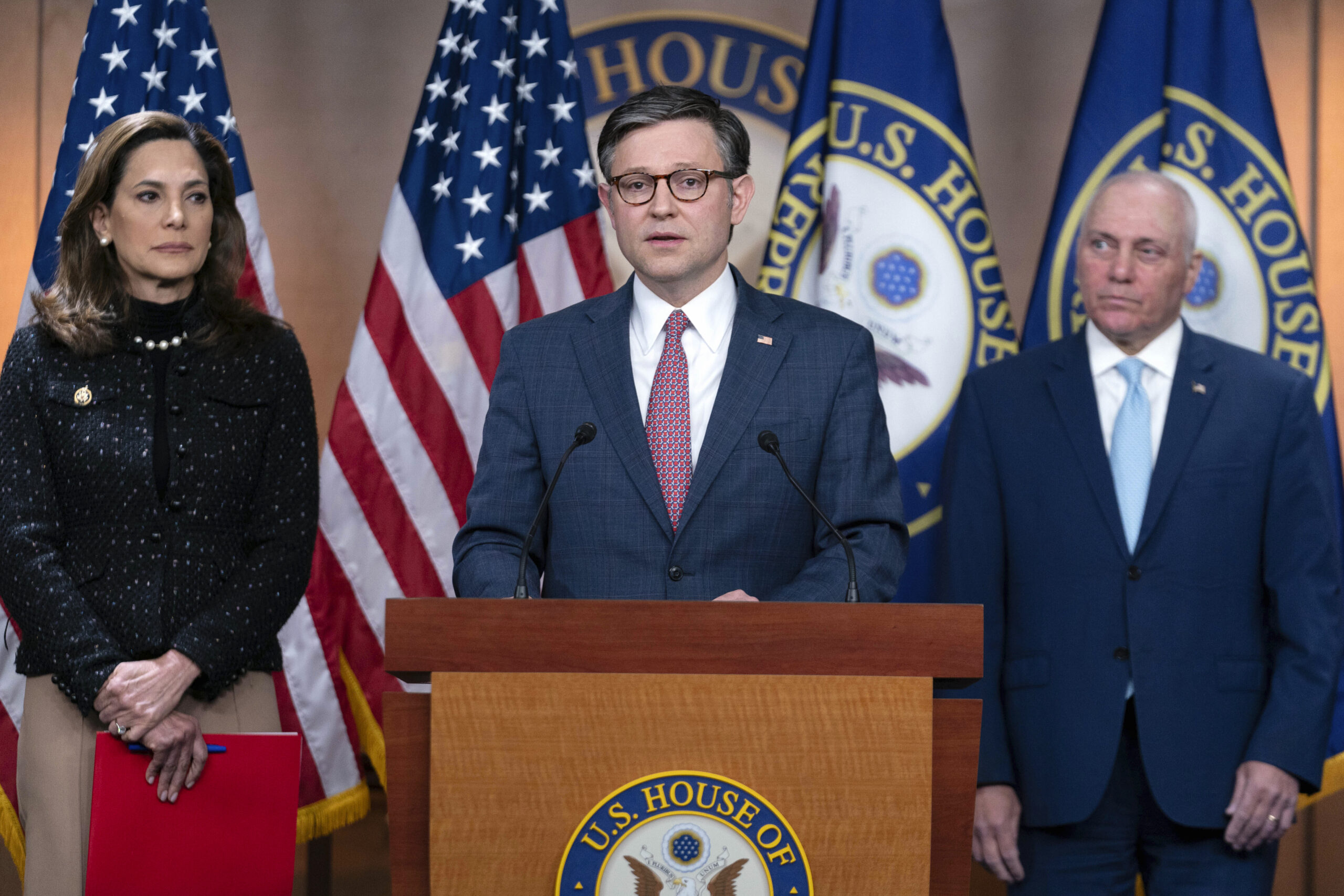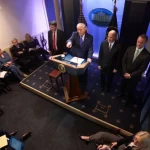

After a group of hard-line Republicans helped tank a procedural rule to move forward with reauthorizing a key surveillance law, GOP leaders are now scrambling to craft a solution just nine days before the current security measures expire.
The House adjourned on Wednesday after canceling evening votes due to intraparty dissension among GOP lawmakers over proposed reforms to Section 702 of the Foreign Intelligence Surveillance Act. Lawmakers met in a closed-door meeting that evening, the second such gathering of the day, to plot a path forward, an effort that concluded without a clear path forward.
“It was mostly just members explaining their positions and embarrassing the conference, which we already have,” said Rep. Byron Donalds (R-FL), a member of the House Freedom Caucus. “And so I think the most important thing now — is what is going to be the process that gives our members an opportunity to voice their concerns through the voting process.”
But House Speaker Mike Johnson (R-LA) emerged from the meeting optimistic, telling reporters he would continue meeting with lawmakers Wednesday night and Thursday morning in order to come to a compromise.
“We’re going to try to find a way to unlock the rule, and I think it’s possible,” Johnson said.
The meeting comes after a vote to begin debate on FISA reform was overthrown by 19 Republicans who joined all Democrats in tanking the measure. The failed vote effectively leaves the House at a standstill, putting lawmakers in a time crunch as the foreign surveillance bill is scheduled to expire on April 19.
As lawmakers left the meeting, many said they were unsure of what the path forward would be and that all options were on the table.
Some hard-line conservatives suggested the House should buck the current proposal and instead consider the FISA reform bill introduced by the Judiciary Committee last year.
“What we ought to do is go back to the Judiciary bill, which is supposed to have jurisdiction for this issue, and then we ought to have amendments that are voted on in an open amendment process,” said Rep. Bob Good (R-VA), who voted to tank the bill. “And then we have a debate and we have votes and we go on record before the American people and our constituents. That’s what we’re supposed to do.”
In the lead-up to Section 702’s expiration, the Judiciary and Intelligence committees introduced competing proposals with a slate of new reforms that primarily involved tightening restrictions on the FBI’s use of the surveillance program. Although the two committees largely agreed on most of the reforms, they have remained deeply divided on whether to require FBI agents to obtain warrants when using Section 702 to search data belonging to U.S. persons.
That measure was stripped from the legislative text that was voted on Wednesday.
Some lawmakers floated the idea of passing a clean extension of the bill that would make no changes to the current surveillance law. Others suggested a short-term extension that would buy lawmakers more time to negotiate comprehensive reforms that can pass the House and Senate.
But that may be easier said than done, according to some Republicans.
“Some things are just never going to get hashed out; people believe some things about the FISA program that are not true, and I cannot convince them otherwise,” said Rep. Dan Crenshaw (R-TX). “Some things just can’t be agreed upon, and that’s why you have votes.”
That sentiment was echoed by other lawmakers, who described the closed-door meeting as tense and unyielding of results.
“That meeting was pure chaos. It wasn’t productive at all. Members were yelling at each other,” said Rep. Max Miller (R-OH). “There is no path on FISA. If anyone says there’s a path forward on FISA right now, they’re lying.”
“There’s no pathway forward. I have no idea what they are going to do,” he added. “The speaker literally is going to have to pull a rabbit out of a magic hat for this thing to work at this point.”
Miller said some members also proposed consequences for the Republicans who voted to tank the rule, but the Ohio Republican said such a move was unlikely to happen.
“That’s been brought up since Speaker McCarthy left, and it hasn’t happened,” Miller said. “I think if someone would have said censure, the entire room would have erupted. I don’t think people should be censured if they vote against rules.”
The standstill underscores one of Johnson’s toughest challenges yet in his speakership, which is already on the rocks as he faces several legislative challenges and a looming threat to remove him from his top position. Rep. Marjorie Taylor Greene (R-GA), who introduced a motion to vacate Johnson last month, said how Johnson proceeds on the FISA issue could determine his fate.
“How he handles the FISA process and how he handles funding Ukraine is going to tell our entire conference how to handle the motion to vacate,” Greene said earlier in the day.
Instead, Greene has urged Johnson to bring another resolution to the floor that allows for open amendments and debate.
“I think that’s the most transparent, honest way to conduct affairs in Congress,” Greene said. “I certainly think it’s a fair thing to do. What really grieves me today about the FISA vote is I felt I was fully supporting Warren Davidson’s amendment [to require search warrants], but that amendment didn’t make it to the floor.”
But other Republicans have defended Johnson’s leadership so far, acknowledging the challenges of needing to wrangle all corners of the GOP conference with such a slim majority.
CLICK HERE TO READ MORE FROM THE WASHINGTON EXAMINER
“It’s a reflection that we have a very, very, very small majority and an attitude of not wanting to help the team,” said Rep. Mario Diaz Balart (R-FL). “It’s important to stick with the leadership on these procedural issues, which is what allows us to run the floor as a majority. Otherwise, we are just turning the floor over.”
The House is set to return on Thursday, although it remains unclear whether lawmakers will reconvene for votes.






